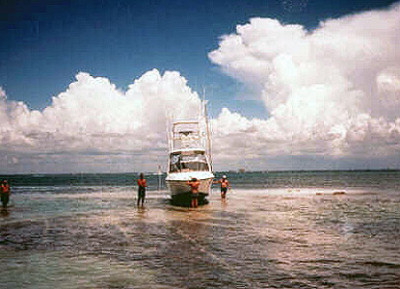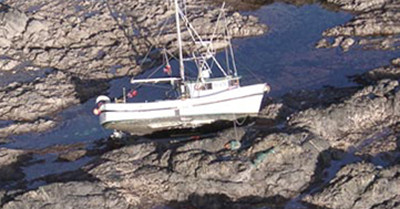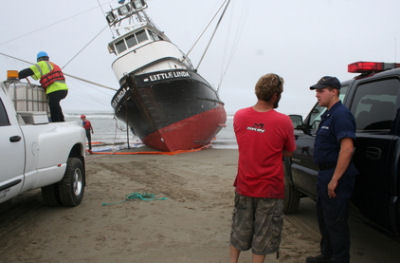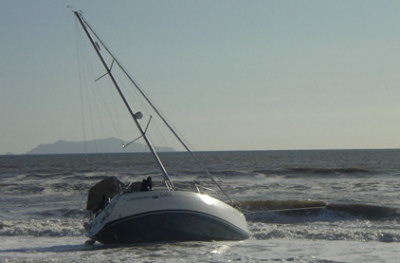Running Aground Is Only Half the Problem
As most regular readers know, Sea Tow is one of our sponsors, so when a friend of ours ran aground and was aided by a Sea Tow captain a month ago, our ears perked up. It seems that our friend chose to believe what he was seeing on his chartplotter while going north on the ICW and cut inside a nav buoy because "there was plenty of water." Seeing other boats do the same thing, he thought it was safe for him, too. Yup, his 60' twin inboard motoryacht ended up hard aground.
 This angler must have been chasing bonefish with his boat rather than a long cast. We wonder what happened to his running gear as he waited for high tide? |
Our buddy contacted Sea Tow and presently a rescue boat arrived. Our marooned mariner was a bit surprised at first because the rescue crew did not immediately throw a line aboard and start hauling. Rather, the Sea Tow captain reconnoitered the situation first. The boat's bilge was checked to make sure that stuffing boxes were intact and there was no damage to the hull, and it was not leaking. In fact, one shaft had been pulled aft an inch or so, damaging the transmission, but the bottom was still sound.
 Even commercial fishermen occasionally make mistakes. |
Work Begins
The rescue captain then backed his boat up to the grounded vessel and used his own prop wash to clear mud away from the stranded vessel's running gear.
It was only after the Sea Tow captain felt reasonably sure that the boat's running gear wouldn't be damaged that he began to move the boat into deeper water ever so gingerly, almost an inch at a time we were told.
In fact the tow captain was well aware that he could do more damage to the boat than had already occurred. To have simply used brute force to haul the 60-footer off the mud flat risked tearing the running gear off and making a hole in the bottom of the boat. Had this happened, the damage caused by the rescuing party would have been far worse than what the boater had done in the first place.
Because the diameter of the props on our friend's vessel were huge and presented a lot of drag when being towed, the haul home was a long slow one, indeed. Six hours after being extricated from the mud, the boat was hauled out in port on a travel lift. The Sea Tow captain was there to take pictures of the boat's bottom and gear -- no further damage was done by the tow. Our friend was extremely happy about the outcome of the tow and gave the Sea Tow captain his heart-felt approbation.
 "I don't understand it, officer, there was plenty of water here yesterday." |
Happens All The Time
Running aground happens all the time, particularly in the ICW, both inside as well as outside of the channel markers. And information displayed on chartplotters is not always accurate, particularly in places with tidal rips, in channels, inlets, harbors, places where dredges are working, as well as places that have never been adequately surveyed in the first place. For example in the Sea of Cortez we have seen chartplotters off as far as half a mile.
As it turns out in this particular case, according to those with local knowledge "as many as 50 boats" had run aground in the same place as our unlucky friends in the last two years. While that might be a bit exaggerated, we all know of places in our own waters that can easily fool transients. That's what local knowledge is all about.
 Of course when it comes to running aground, no single group does more than our sailing friends. They often draw much more water than powerboats. |
Was He a Member?
As it turns out, our friend was not a member of Sea Tow. We knew that six hours of towing plus travel time to the accident, plus the time to make sure that the boat could be safely pulled off the mud, all did not come cheap. When discussing this mis-adventure, our usual journalistic inquisitiveness failed us, as we did not inquire as to how much the tow cost.
How does one ask a friend a question that one knows will be embarrassing to answer? One simply doesn't ask it. But since he owned a 60-footer he could, we figured, take the towing bill in stride, chalking it up to one more expensive lessen in boat ownership, just like the rest of us do. Nevertheless, we were taken to believe from our last conversation that he planned on joining before the boat was re-launched.
True story.